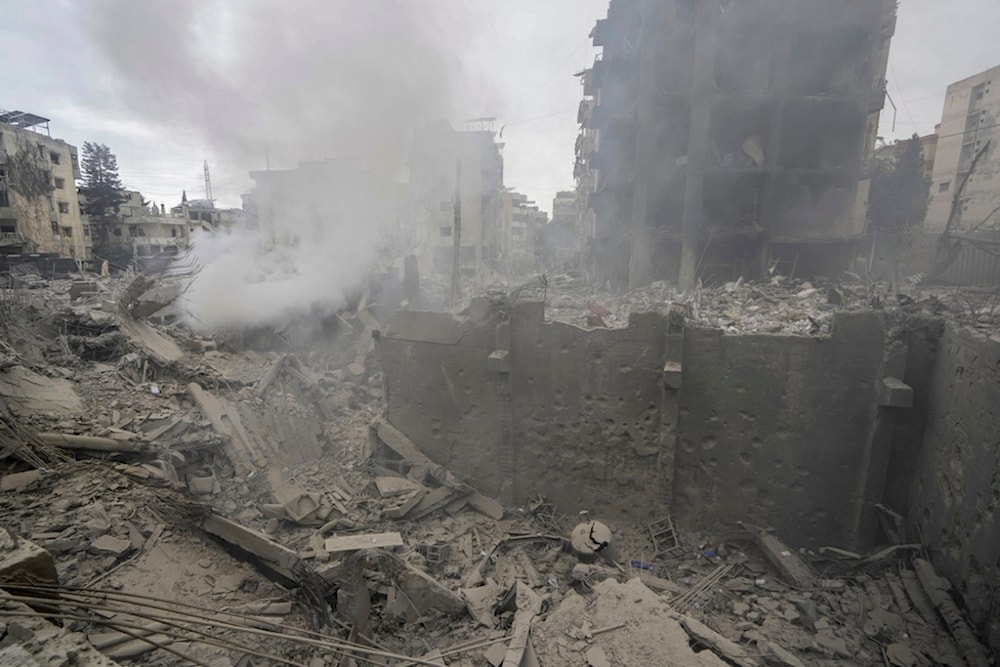UN warns of Gaza-level devastation as war on Lebanon escalates
As "Israel’s" bombardment of Lebanon intensifies, the United Nations' World Food Programme (WFP) expresses deep concern over the similarities between the two situations.
-

Smoke rises from destroyed buildings at the site of an Israeli airstrike hit in Choueifat, southeast of Beirut, Lebanon, Monday, Oct. 7, 2024. (AP Photo/Bilal Hussein)
UN humanitarian officials on Tuesday called for urgent action to prevent the escalating conflict in Lebanon from descending into the same level of devastation seen in Gaza.
As "Israel’s" bombardment of Lebanon intensifies, Matthew Hollingworth, the Lebanon country director for the United Nations' World Food Programme (WFP), expressed deep concern over the similarities between the two situations.
"We need to do everything we can to stop that from happening," Hollingworth urged, speaking from Beirut during a press briefing in Geneva.
Having spent the first half of the year coordinating WFP operations in Gaza before transitioning to its Lebanon office, he said the threat of Lebanon falling into the same "spiral of doom" weighed heavily on his mind. "We shouldn't allow that to happen," he added.
Read more: Hezbollah pounds numerous Israeli sites amid aggression on Lebanon
"Israel’s" ongoing war on Gaza has so far claimed over 41,900 lives, many of whom are women and children, according to the health ministry in Gaza. The war has since spilled into Lebanon. In less than two weeks, "Israel’s" aggression on Lebanon has resulted in over 1,100 martyrs and displaced more than a million people.
Hollingworth noted that many fleeing the violence had witnessed the destruction in Gaza over the past year, fueling fear and urgency. "That is deep in their gut, in their hearts, in their minds," he said.
Devastation beyond belief
UNICEF spokesman James Elder highlighted the disturbing similarities between Gaza and Lebanon, particularly in the displacement of civilians and the impact on children.
Jeremy Laurence of the UN rights office echoed this, pointing out that Lebanon was experiencing the same patterns of devastation seen in Gaza.
"The devastation is beyond belief for all people in Lebanon as it is in Gaza. We can't let this happen again," Laurence said.
Read more: 'Israel' carried out 26 airstrikes on Beirut in 24 hours
Despite humanitarian efforts to meet the growing needs in Lebanon, Hollingworth stressed that de-escalation was the priority. While WFP currently assists around 150,000 people daily, the need is far greater, with nearly one million people requiring aid each day.
Hollingworth also highlighted the damage to Lebanon’s agricultural sector, with 1,900 hectares of farmland burned and 12,000 hectares abandoned.
The WFP faces a $115 million funding shortfall to meet Lebanon’s needs over the next three months.
The World Health Organization (WHO) has also raised alarms about the worsening situation in Lebanon, noting 16 attacks on healthcare facilities since mid-September. These attacks have left 65 healthcare workers dead and 40 injured.
Five hospitals are now non-functional, and nearly 100 primary health centers have been forced to close, according to Ian Clarke, WHO's deputy incident manager in Lebanon. Clarke warned of the heightened risk of disease outbreaks due to limited access to care.

 3 Min Read
3 Min Read








